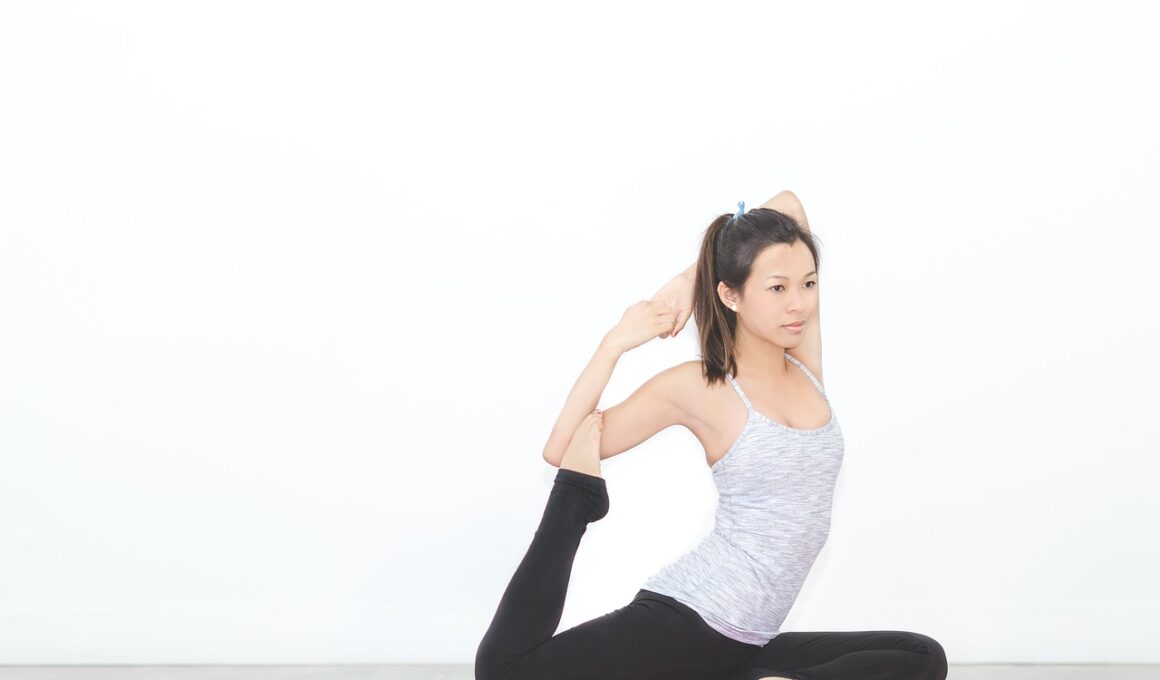Using Yoga to Manage Stress and Anxiety in Competitive Athletes
In today’s fast-paced sports environment, athletes often encounter immense stress and anxiety levels. These feelings can stem from various sources including intense competition, high expectations, and personal goals. In many cases, the pressures can be overwhelming, impacting not only mental health but also athletic performance. Yoga has emerged as a powerful tool for athletes aiming to cultivate balance, resilience, and a calm mindset. By incorporating yoga into their training routines, competitive athletes can effectively manage stress and find a refuge from the pressures of their sport. This holistic approach emphasizes breathing techniques and mental focus, both essential elements for maintaining emotional balance. Athletes who practice yoga can also enhance their physical flexibility and strength, making it an ideal supplement for peak performance. Regular yoga practice encourages self-awareness and mindfulness, which can lead to better emotional regulation during high-pressure situations. Through the integration of yoga into their training regimens, athletes can not only improve their physical capabilities but also cultivate a mental edge suitable for competitive environments, thus contributing to their overall well-being.
The Mental Benefits of Yoga for Competitive Athletes
The mental health benefits gained from yoga practice are especially vital for competitive athletes. High-stakes competitions exacerbate feelings of anxiety and stress. However, the discipline of yoga fosters mental endurance through techniques that help ground one’s thoughts and emotions. Regularly attending yoga classes or practicing at home can teach athletes how to calm their minds amidst chaos, an essential skill when facing tough opponents or life events. Moreover, practices such as meditation and mindfulness integrated within yoga routines allow athletes to cultivate a deeper level of self-awareness and emotional health. Most importantly, cultivating such mental clarity aids in focus during competitions, ensuring athletes perform at their best. More athletes are reporting decreased anxiety levels and heightened performance when incorporating yoga into their schedules. It’s an ancient practice that resonates with modern athlete needs. By enhancing the mind-body connection, athletes can confront pressures effectively, transforming anxiety into motivation and focus. Consequently, the synergistic effect of yoga not only inspires athletes but also contributes to healthier mental, emotional, and overall physical performance predispositions.
In order to maximize the advantages yoga brings to competitive athletes, it is essential to choose the right style of practice. There are various forms of yoga available, such as Hatha, Vinyasa, or Yin, each offering different benefits. For athletes seeking relaxation and stress reduction, Yin Yoga may be highly effective due to its slower pace and focus on deep stretches. This improving flexibility aids in recovery and injury prevention. Alternatively, Vinyasa Yoga can provide a more vigorous workout while still addressing stress. The flow of movements helps athletes release pent-up tension while enhancing coordination and strength. Athletes should select a style that aligns with their specific needs and goals. Some may even choose to combine elements from different styles for a holistic approach. Additionally, it may be beneficial to consult with a knowledgeable instructor who can tailor sessions to individual needs. This personalized attention ensures athletes get the most out of their practice. Ultimately, understanding various yoga styles is crucial for optimizing their mental and physical well-being. Moreover, enjoyable practice increases the likelihood of staying committed to this valuable addition to their training.
Practical Ways to Incorporate Yoga into Training
Incorporating yoga into an athlete’s training routine can be straightforward and complementary to existing programs. Firstly, athletes can allocate just a few minutes each day to focus on simple yoga poses and stretches. Key poses such as Downward Dog, Warrior II, and Child’s Pose can develop both flexibility and strength. Athletes can easily integrate short sessions of yoga during warm-ups or cooldowns, enhancing muscle recovery and mental focus. Setting aside specific days for longer yoga sessions, perhaps once or twice a week, can also help reinforce physical and mental benefits. Many athletes find community support in group classes, enhancing motivation and accountability. Furthermore, online platforms offer ample guided yoga sessions specific to athletes, making practice convenient and accessible. This flexibility encourages continued commitment. Incorporating breathing exercises and meditation techniques during these sessions further cultivates mental resilience. Visualizations can also play a significant role in preparation, aiding athletes in setting goals and envisioning success. Overall, the key lies in finding the right balance of yoga practice to augment their training and sustain long-term performance improvements and stress management.
Contemporary athletic culture emphasizes peak performance and unwavering discipline. Yet, acknowledging the importance of mental health is equally crucial. Research indicates that athletes often neglect self-care, potentially leading to burnout and injuries. Through yoga practice, athletes not only complement their physical training but also provide themselves with vital mental support. With improved self-awareness gained from yoga, athletes can identify and address their emotional and mental states proactively. This could mean recognizing signs of burnout and implementing strategies to prioritize rest and recovery. Moreover, integrating yoga into their routine encourages athletes to cultivate a greater sense of resilience. As they learn to manage physical sensations through breath and poses, they also cultivate emotional understanding. As a result, athletes become more adaptable, particularly when facing challenging situations in their sports. Allowing themselves to engage in practices that serve their whole being—mental, physical, and spiritual—fosters a culture of holistic wellness. As athletes embrace yoga, they inspire their peers to approach athleticism with a focus on sustainability, fostering better lifestyle choices and practices that can lead to longer, healthier careers.
Building a Community through Yoga
Engaging in yoga practice can foster a sense of community among athletes, especially with team dynamics being crucial for success. Group yoga sessions promote camaraderie, encouraging athletes to share experiences and challenges while developing a supportive environment. The shared journey of practicing yoga can encourage open conversations about mental health and stress management within teams. As athletes connect through yoga, they can bolster individual support networks that can benefit performance and emotional well-being. Furthermore, having peers participating in mindfulness practices incentivizes consistent engagement and accountability. This collaborative atmosphere can also lead to collective learning experiences, where athletes discover new techniques and approaches together, enriching their practices. By building a culture centered around well-being through yoga, athletes can prioritize mental health alongside performance goals. During competitions, they can draw on strategies learned together, providing comfort and assurance. The team environment infused with yoga principles can lead to improved communication and trust. Consequently, fostering these characteristics not only benefits performance but also enhances long-lasting relationships among athletes, contributing positively to their athletic journeys.
In conclusion, yoga provides competitive athletes with essential tools for managing stress and anxiety. Its physical and mental benefits foster a holistic approach to training, enhancing both athletic performance and emotional resilience. As athletes redefine what it means to be competitive, incorporating yoga into their routines addresses well-being entirely. Recognizing the connection between mental health and athletic performance is crucial for creating balanced athletes. Through consistent practice, they can mitigate the adverse effects of stress and anxiety while developing coping skills that extend beyond competitive settings. Coaches, trainers, and sports organizations are encouraged to integrate yoga into their training philosophies, recognizing the significance of mental health in overall performance. Creating an environment that supports mental well-being ultimately enhances athletes’ competitive experiences and personal growth. As more athletes turn to yoga, they set new trends in sports culture emphasizing self-care and mindfulness. The journey of the athlete transcends the physical realm, encapsulating emotional strength gained through practices such as yoga. Thus, by prioritizing overall wellness, they not only enhance their capabilities but also enrich their lives, not just as competitors but as individuals.


